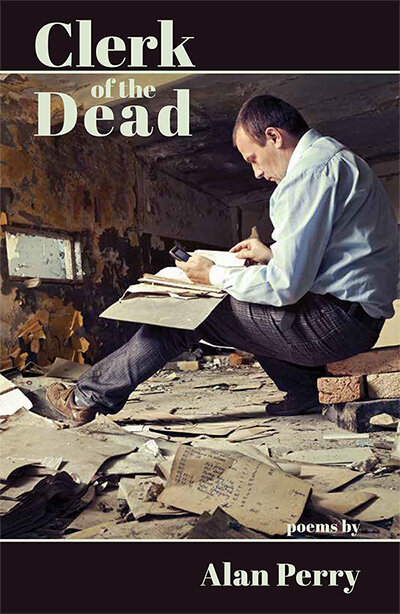Clerk of the Dead
Clerk of the Dead by Alan Perry, Main Street Rag Publishing Company, $12
“Every day I weightlift/ the quiet grief that stuffs/ a briefcase I carry/ from this place to the next.”
As I write this, America is undergoing great political uncertainty. My wife and I are checking in with each other every fifteen minutes or so about the latest vote counts in states like Pennsylvania, Georgia, Arizona, and Nevada. This week I have frequently found myself refreshing news websites waiting for the big reveal, the epic climax of a long and hard-fought election. This has not been particularly healthy. Therefore, it was something of a treat to read Alan Perry’s Clerk of the Dead, a chapbook about the small or dying things we often ignore in the course of major events.
As the title suggests, this is a chapbook concerned with mortality. The title poem itself is a unique blend of entropy and bureaucracy that I found both humorous and edifying, “I meet them in their dark upright caskets/ file cabinets that reflect low light/ from metal-shaded bulbs in the record room.” This poem sets out Perry’s mission in Clerk of the Dead, to meticulously catalogue that which is in danger of being lost forever. Often, it is the names and lives of the dead he is recording. In “Witness” he writes about a tanker crashing into a ferry and killing 78 people and in “Cloud Bank” the narrator reads the obituary of a friend from a high school English class.
Perry is also recording the simple occurrences of nature in this volume. This is where he reveals his greatest strengths as a poet. Lines like, “in now voiceless woods I hear/ only rain that slips off branches,/ puddling along trails/ as if from weeping trees” pull you in with their great natural imagery. Just as he is cataloguing the names of the dead, he is attempting to document nature before it too passes on. In his poem “Evacuation” (written for the conservationist Rachel Carson) he laments, “no longer mating/ bees and flowers/ drifted through sterile air.” Perry is masterful at revealing the significance of small things. I am one who believes this is the sacred task of a poet, to observe the objects that go unnoticed and listen to the voices that remain unheard. It was encouraging to see Perry embrace this role in Clerk of the Dead.
This belief in the significance of small things lends itself to the simple yet sharp imagery contained in this chapbook. Whether it’s “a small red dot/ the size of a nickel” or a “wispy cirrus cloud/ lofting itself away from the others”, Perry writes of objects with clarity and care. A few of the metaphors in the book didn’t quite land for me, but Perry’s passion for the dead, dying, lost, and forgotten is seen in his precise and rhythmic imagery as he inspires you to care about all of it along with him.
As I mentioned above, there is a lot of uncertainty right now. But as we move forward, in whatever direction that may be, I hope that more of us show a greater capacity to become a Clerk of the Dead. That means approaching the world with care whether we are telling the story of an artichoke as Perry does in “Souvenir” or quietly attending to the needs of the dying as the narrator does in his poem “Pleas”. This is a role more important than ever and in his new chapbook Alan Perry nobly leads the way.
Benjamin Schmitt
An author of three books, most recently Soundtrack to a Fleeting Masculinity, Benjamin’s poems have appeared or are forthcoming in Sojourners, Antioch Review, The Good Men Project, Hobart, Columbia Review,and elsewhere. A co-founder of Pacifica Writers’ Workshop, he has also written articles for The Seattle Times and At The Inkwell. He lives in Seattle with his wife and children.


